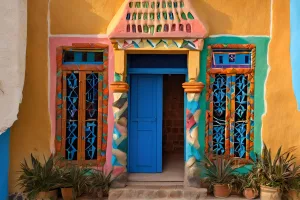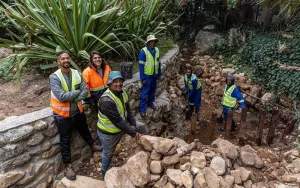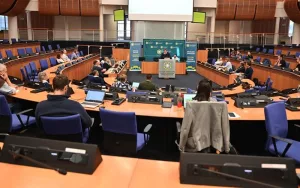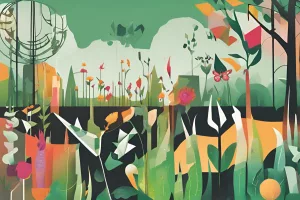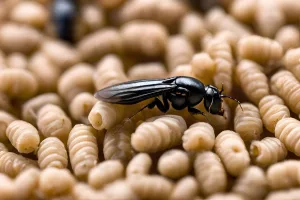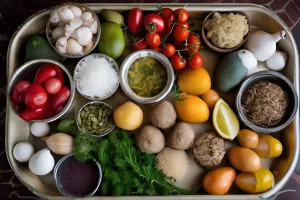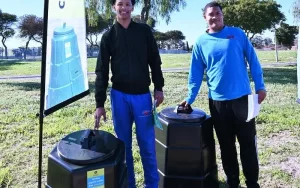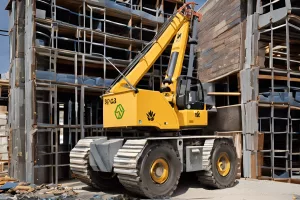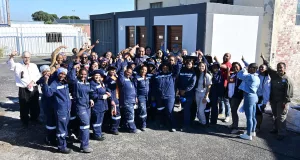FYN restaurant in Cape Town is a toprated eatery that combines Japanese and South African culinary traditions to create a unique dining experience. Chef Peter Tempelhoff and his team have earned multiple awards and recognition, including a spot on The World’s 50 Best Restaurants list. FYN’s commitment to sustainability and collaboration with local providers and producers make it more than just a restaurant, but a testament to South Africa’s flourishing food culture.
Four ecoinnovation pioneers stand out at Bay Harbour Market in South Africa, showcasing profitable and sustainable models for operations. They address issues such as textile waste, carbon footprint, and plastic pollution while empowering local communities and promoting creative thinking towards a greener tomorrow. These green pioneers prove that sustainability is a feasible and profitable avenue that fosters community, creativity, and care for the environment.
Decorex Cape Town, the ultimate interior design exhibition in South Africa, is making a comeback from 6th to 9th June 2024. Attendees will witness innovative showcases, dialogues, and exhibitions, featuring 230 creative companies. Expect to see the future of 3D printing, sustainable housing, exciting design showcases, engaging dialogues, and South African brands. The event unites industry pioneers, design enthusiasts, and the public for a stimulating and captivating experience.
The Scone Shack is a sustainable eatery in Cape Point, Cape Town, founded by Karl Odendaal, a minimalist committed to offgrid living. The Shack is ecofriendly with salvaged windows and wood scraps, selfsufficient in energy, and reliant on solar power for electricity and alien wood for its woodburning oven. Visitors can enjoy vegan and glutenfree options and walk barefoot while enjoying the serene atmosphere of the space. The Shack is a sanctuary of peace, a throwback to simpler times, and a celebration of a conscious, sustainable lifestyle.
The Majestic Transformation of Cape Town’s Skyline: The Cape Winelands Airport Expansion
Cape Town’s Cape Winelands Airport is undergoing a massive $460 million expansion, with plans to extend a runway to 3,500m and become the most ecofriendly airport in the world. The project is expected to create 60,000 new jobs and serve as a backup for Cape Town International during emergencies, reducing carbon emissions and conserving fuel. The expansion is set to transform Cape Town’s skyline, bringing economic growth and environmental responsibility to the forefront.
Experience the serene and sustainable Gonana Collection in the peaceful fishing village of Paternoster, where each of the seven properties is powered by solar energy and offers a warm embrace of the idyllic environment. Discover a tapestry of sustainability woven from unrefined local materials and collaboration with local craftsmen. Embrace the Gonana lifestyle and contribute to the evolution of travel in this sanctuary for contemplation and mindfulness where nature and elegance intertwine.
Cape Town’s Catchment, Stormwater, and River Management department is leading a largescale project to rejuvenate the Blinkwater Stream in Camps Bay. The project aims to repair the concretelined channel, construct two silt basins upstream to trap large boulders, and equip the city to better resist future weather adversities. The innovative project, which integrates several detailed strategies, reflects the city’s commitment to sustainability and proactive infrastructure maintenance.
The Permit Advisory Forum (PAF) is a new initiative by the City of Cape Town to ensure compliance with marine outfall regulations and promote ecological responsibility. The PAF will manage effluent discharge volume and quality, pipeline maintenance, and environmental monitoring. The forum also explored innovative alternatives for waste management, including shortterm refurbishments and longterm wastewater treatment plant constructions. This pioneering effort aims to usher in a new era of sustainable and ecoaware ethos towards environmental stewardship.
Cape Town’s Energy, Water and Waste (EWW) Forum brings together the city and local businesses to work towards responsible resource management and sustainability. The forum focuses on innovative solutions to tackle organic waste management challenges and landfill diversion, with the goal of reducing organic waste in landfills by 50% by 2022 and achieving 100% organic waste diversion by 2027. The forum demonstrates the power of shared knowledge and collaboration in driving sustainable change and serves as an inspiring model for cities worldwide.
Maltento is a South African company that breeds black soldier flies to convert agroprocessing waste into proteinrich pet and aquaculture feed. Their unique farming methods not only produce functional proteins, healthy fats, and essential amino acids but also excrete a byproduct known as frass that has considerable nutritional value and can improve soil fertility. Maltento’s innovation and commitment to sustainability challenge preconceptions in the agritech and pet food industry, and their groundbreaking work highlights South Africa’s role in the global innovation landscape.
Cape Town’s Water and Sanitation Vision aims to provide dignified water and sanitation services to all residents, with a proposed budget of R5,317bn dedicated to water and sanitation in the financial year of 2024/2025. The plan includes installing new taps and toilets in informal settlements, diversifying water sources, and improving infrastructure and treatment facilities. The city is also committed to building resilience during instances of loadshedding, preserving the environment, and reducing the risk of pollution. This investment signifies a brighter, sustainable future for the city and its inhabitants.
Emazulwini Restaurant in Cape Town has achieved global recognition for its delicious flavors, warmhearted service, and lively personality. The restaurant prioritizes locallysourced and sustainable ingredients, making it stand out in the food industry. Chef Mmabatho Molefe, the creative mind behind Emazulwini, has had an impressive journey in the gastronomic world, recognized as one of the World’s 50 Next Hospitality Pioneers for her innovation in Zuluinspired cuisine. Although the restaurant has closed its doors, there are hints of a potential comeback, and its recognition highlights the impact of local, sustainable, and personalityrich culinary establishments worldwide.
‘Stop Food Waste Day’ is an important day that reminds us to make responsible choices, reduce carbon emissions, and strive for sustainability. Food waste contributes to global warming and climate change by releasing methane gas. We can take simple steps like mindful meal planning, proper storage of food, creative cooking, and supporting food redistribution initiatives to reduce food waste. Businesses also play a significant role in reducing food waste. By making small changes, we can safeguard our future and create a more resilient planet.
The Carbon Smart Skills Development program in Cape Town is transforming the lives of unemployed women by providing them with comprehensive training in green building principles and Biomass Insulated Concrete (BIC), an ecofriendly building material. The program promises jobs for three years and is not only a skill development initiative but also a beacon of hope and change for a more sustainable future. The use of BIC in construction projects is a paradigm shift that promotes the construction of green infrastructure across the city, minimizing carbon footprints during construction. The program aims to empower women and contribute to the green economy.
JessicaAnn Shepherd, the founder of clothing brand Oddity, has won the Mr Price New Talent Search 2024, a prestigious fashion competition in South Africa. Her winning collection, ‘Eco Dream Reimagined,’ impressed the judges with its sustainable approach to fashion, using upcycling methods and excess fabric to create vibrant and unique designs. As well as receiving a cash reward and mentorship programme, Shepherd will design a collection to be sold in select Mr Price stores next year. This win is a testament to the emerging talent in South Africa’s fashion industry.
The Carbon Smart Skills Development Programme is an innovative project in Cape Town that empowers jobless women through ecoconscious skills training. The curriculum includes green building concepts, small to mediumsized enterprise development, and soft skills for the workplace. A unique aspect of the program is the use of alien invasive species for environmentally friendly building materials. The initiative equips women with skills to succeed in the growing green economy, benefiting the community as a whole.






